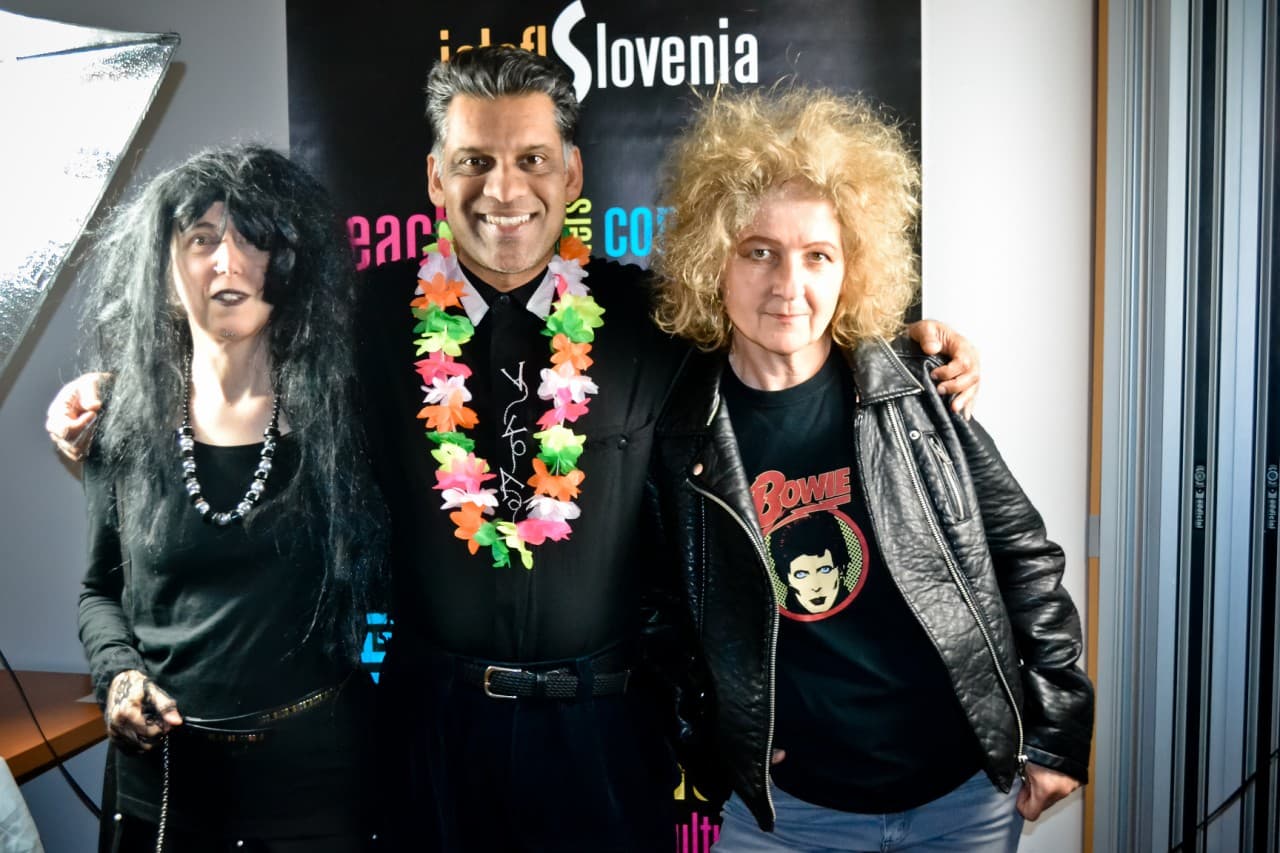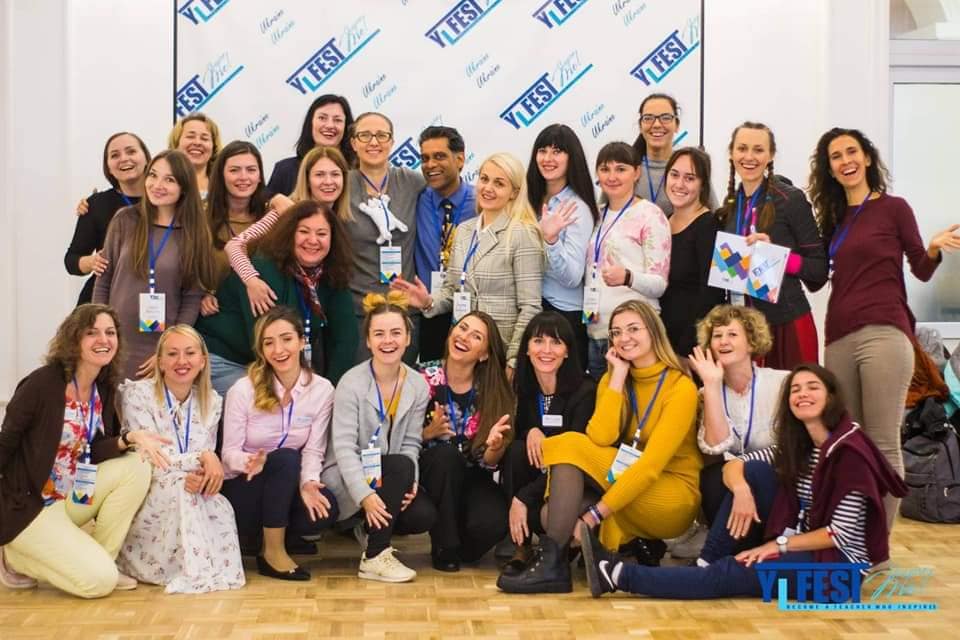Are Face-to-Face Conferences Still Worth Going To?
Danny Singh, born and raised in London, but now based in Rome and Canterbury, gives creative English language lessons and teacher training courses all over Europe. He also offers stimulating monthly presentations on language related issues at Rome’s biggest international bookshop and has his own YouTube channel which contains a series of interactive English video lessons. He is author of two books, “I was a happy man...then one day I came across Laughter Yoga” and “Learning English through the mind and the body” and is currently working on his third book, “Life is full of surprises”. He regularly attended Pilgrims TT summer courses in Canterbury as a Guest Speaker. Website: www.laughnlearn.net
Email: singh_danny@hotmail.com
Editorial note
This article was originally published in the Winter 2022 issue of IN mag (the Slovenian IATEFL mag).
My IATEFL Slovenia Conference experience
The IATEFL Slovenia Conference in Topolšica back in 2013 was where it had all begun, my first presentation at an international teaching conference, a one-off experience I had assumed. Little did I know that I’d be back the following year and almost every other year, plus have attended several other conferences in the meantime, as I entered this endless spiral of travelling to conferences, month after month.
The only IATEFL Slovenia conference that I had the audacity to miss was in 2015, as it came just as my first ever book was about to be published and I was working to a strict deadline. I even attended the smaller national conference in Slovenia in October 2020, as the only non-Slovenian representative. Many people thought I was either extremely courageous or completely mad to even think of attending that one, as it came in a moment in which it was clear that new restrictions were coming back into force. This was after a summer in which we had all breathed a sigh of relief assuming that the nightmare was over. The reason I made the decision to go to that one, despite the lack of international colleagues, no social programme and of course few participants was that from March to October 2020 everything had been online.
As it was, fortune favoured the brave and my trek across two borders to get to this conference was well worth it, as I had the pleasure of seeing people in the flesh again, unmasked faces from time to time, real smiles, real coffee breaks, I noticed people’s clothing much more than I usually did. The other reason I was grateful that I had gone was that there were no other face-to-face conferences after that in 2020, much less in 2021 where everything remained fervently online.
For those of you who have never attended a face-to-face conference, you might be wondering how on earth I ended up attending so many other conferences around different parts of Europe, when in reality, the Slovenia conference is my favourite.

What makes the IATEFL Slovenia Conference so special?
When I travel to conferences all over Europe, one of the main topics of conversation is to discuss which are our favourite conferences and why. I always give the same answer, my favourite conference is the IATEFL Slovenia one. The reasons are many, firstly, everything is held in the same location, that means we sleep, eat, give and attend talks and socialise in the same hotel. It also means that we don’t have to carry around books and other materials that we might need all day, we can even change clothes during the day, being smartly dressed for some occasions and casually dressed for others. We can also go to the swimming pool when we like or have a nap if we are exhausted. When I want to speak to someone in particular, I know that I will find them somewhere once I know their habits, they might be an early riser who gets down at dawn for breakfast, or they might be standing on a staircase in the evening with a glass of wine, there’s no chance of them disappearing at the end of the talks never to be seen again.
Another thing that makes the Slovenia conference so great is the social programme. There is really a wide range of activities from the international evening (my favourite event), where you can sample a range of culinary pleasures often home-made, pub quizzes and lip-synching to name a few. The workshops and plenaries are generally of high quality too, but the thing which really makes the Slovenia conference is the S factor. There are two S factors in fact. The first is Sandra (Vida). Without her, the conference would never be what it is and the second is students. Not simply the fact of having them, after all, several conferences have them, but they are often passive and just there to bolster their CV, while at the Slovenia conference, they really do put in a full stint of work. Naturally, the fact that they give so much means that they often get back in return much more than student volunteers at other conferences do.
Avoid drinking wine at conferences
Here’s what happens if you do drink wine at conferences. As I sipped a glass of wine at the 2013 Slovenia conference, I was approached by a couple of Croatian ladies who asked me if I’d ever heard of their conference. I replied that I hadn’t and they promptly began to explain why their conference was even better. It sounded appetizing and sure enough in 2014 as I sipped a glass of wine at the HUPE Croatia conference in Opatija, I looked out at the sea and thought that this conference and location was truly marvellous. I was then approached by a Hungarian who asked me if I’d ever heard of the conference in Budapest. And so it went on and on. At each conference, I would be approached by someone from another country promoting their conference and I would eventually be enticed into going. If you don’t watch yourself, you could end up going to a different conference every weekend, so be careful!
By 2019, I was probably attending about 14 or 15 different international conferences. All this came to a head in March 2020. Having just scrambled back into Rome from Athens after attending the TESOL Greece conference, I was told by the then Italian Prime Minister Giuseppe Conte, that from midnight they would be closing the borders and I was not going anywhere. Ironically, the next conference on my list was to be the Slovenia conference of March 2020, yes, the same one which was postponed to October and then done on a slightly smaller scale.
From March 2020, all international conferences went online, this lasted through 2021 and only in 2022 did some conferences become face-to-face again. 2023 looks even more hopeful, as many countries are returning to the face-to-face format.
Why are online conferences better?
Once we had got over the shock of having to do everything online, we suddenly discovered the benefits of online conferences. Firstly, there was the reduced cost, as we didn’t have to pay any travel or hotel bills. Secondly, we could attend to other needs that we might have, while still following the online conference. Mothers with demanding families could still enjoy quality time with their kids, prepare something tasty for dinner, let the plumber in to deal with a leak in the bathroom, all while following a conference online. We didn’t have to worry about how we looked, make-up became superfluous, we could dress or even not dress, switch off the camera so we couldn’t be seen and best of all, if we attended a talk that turned out not to be our cup of tea, we could quietly disappear and try another without embarrassing anyone, either the speaker or ourselves. Another great advantage of online conferences is that we can attend them wherever they might be, that includes the ones that we would normally never even consider travelling to. After all, aside from the time zone issue, attending an online conference in Asia is pretty much the same as attending one in Europe or South America. Even though we are now moving back towards face-to-face activities, there are many teachers and I understand why, who insist that they are now happy to do most, if not all their work online.

Why are face-to-face conferences better?
Despite the numerous advantages of online conferences, there are some things that they cannot replicate. One of the things I enjoy most about attending a face-to-face conference is actually seeing that country, the people, tasting their food, listening to their language, observing their customs and behaviour. You cannot get that online. In addition, the official coffee breaks, lunch breaks and dinner breaks are real. You get a coffee, some biscuits and something interesting to eat and drink later. But more importantly, the breaks are even more important than the workshops and plenaries themselves, as that’s where networking and connecting is done, where social exchange and cultural knowledge can be picked up.
At the face-to-face conferences that I have attended all over Europe, I regularly sell a few of my books and often get invited to give teacher trainings or have fun with the students at various educational institutions. This is probably the most valuable asset, working with people of different cultures and observing how they react to my approach in a situation which for me is not the norm. During the online conference period, I did not sell a single book at a conference despite them being mentioned by the person who introduced me to the audience, neither was I invited to work with teachers or students, not even online. This is of course no accident; this shows how important a person’s presence is for building up rapport.
Please check the Pilgrims f2f courses at Pilgrims website.
Please check the Pilgrims online courses at Pilgrims website.

I have had fantastic experiences dealing with students in Debrecen (Hungary), Skopje and Struga (North Macedonia) and Thessaloniki (Greece) to name just a few, but probably the one I value most of all was thanks once again to Slovenia and the very last conference in Topolšica 2019, before the location was changed. At that conference, there was a Ukrainian lady, Oksana Vahil who gave an amazing one-hour workshop on activities to use with very young learners, running around, crawling on the floor, curling up into strange positions, the kind of things that I like doing with some of my over-serious businessmen. After her workshop, we had a chat, exchanged ideas and within three months she had organised a workshop in her hometown of Chernihiv, the city of legends. In September 2019, I attended this three-day workshop with about twenty-five enthusiastic teachers from various parts of Ukraine, one day given by Oksana, one day by a German teacher who flew in specially and one day given by me. As well as this, I was taken around this lovely city on various tours, given the opportunity to taste the local cuisine and made to feel welcome at all times.
To conclude, online conferences and online activities in general have given us many opportunities that we lacked previous to 2020, however, they cannot and never will replicate the benefits (of which there are many) of the physical presence.
Are Face-to-Face Conferences Still Worth Going To?
Danny Singh, Italy“Bir lisan, bir insan, iki lisan, iki insan?” Observations and Reflections of an Undergraduate Student on the Situation of ELT in Turkey
Irem Çolak, TurkeyA Free Can
Robin Usher, HungaryFine, I'll Do It Myself: How Writing a Novel for English Learners Changed the Way I Prepare My Own English Classes
Eli Walgrave, US and JapanIs the Queen Really Dead?
Danny Singh, Italy